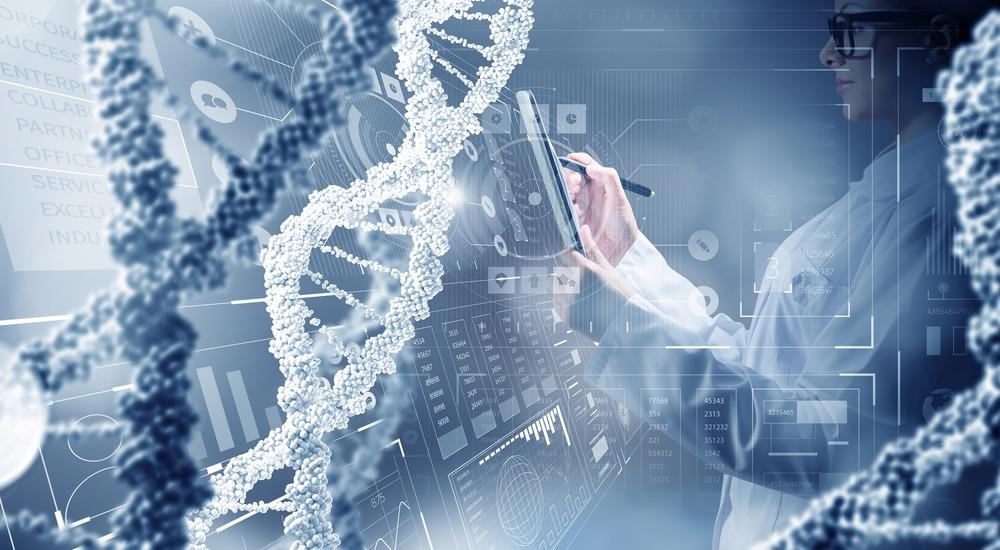Personalized medicine, the use of a person’s genetic information to guide medical decisions relating to the prevention, diagnosis, and treatment of disease, is an emerging field of medicine that shows much promise.

Image Credit: Sergey Nivens/Shutterstock.com
In recent years, many key advances have been achieved in this area, the emergence of personalized treatment for malaria, the discovery of the clinical relevance of the HER-2 gene in breast cancer, and the identification of CYP2D6 as a biomarker that can predict a person’s response to anti-depressant medicine, are just some examples of how personalized medicine is changing the face of healthcare.
Future advancements in personalized medicine are highly dependent on developments in bioinformatics, the sub-field of biology that combines biology and computer science to access, store, analyze and share biological data - most often, DNA and sequences of amino acids. Effective novel therapeutic approaches are likely to arise from advances in personalized medicine, fueled by bioinformatics.
Why is personalized medicine important?
Personalized medicine, also known as precision medicine, is the science of looking to someone’s genetics to predict how they may respond to a certain therapeutic, helping doctors to plan out therapies that will likely be more effective for the individual. It is the move away from the one-size-fits-all approach to medicine. Personalized medicine also covers the use of genetic information to improve diagnostic and preventative techniques. At its essence, personalized medicine relies on the information gathered and interpreted from a person’s DNA to help guide diagnostic, preventative, and therapeutic decisions to gain the best possible outcome for the patient.
Personalized medicine has become increasingly important, as more innovations have emerged from research and development in this field.
Scientists and doctors understand the potential of personalized medicine to improve clinical outcomes for their patients. DNA holds a wealth of information that, if interpreted, holds the key to predicting how a disease may process in an individual and what the most effective treatment may be for them. In terms of effectively treating a disease, time is a crucial factor. There is an urgency to treat a patient with an effective therapy early on in the disease progression in order to garner the best results. Often, time is wasted trialing a therapeutic that ends up being ineffective, allowing the disease to progress as doctors attempt to treat it with what may work best for the majority but, of course, not for all.
Already, personalized medicine has been successfully developed for the treatment of several diseases. In particular, it has been successful in developing new treatments for cancer, including breast, colorectal, esophageal, lung, melanoma, stomach, and some types of leukemia and lymphoma.
What is bioinformatics?
Bioinformatics is the combination of biology alongside computer science. While it refers to the analysis of all biological molecules, it is usually used to refer to the analysis of genes, DNA, RNA, or proteins. It has emerged as a vitally useful tool for comparing genes and protein sequences between organisms. It looks at the differences found and finds patterns across DNA and protein sequences to deduce the function one a gene or protein.
Using bioinformatics, therefore, scientists have been able to discover the function of many genes and proteins, information that is invaluable to developing new therapeutics for a wide range of diseases.

Image Credit: bluesroad/Shutterstock.com
How advances in bioinformatics will pave the way to novel therapeutics
Over the last decade or so, there have been several key advances in the field of bioinformatics that offer a great potential to be leveraged into healthcare. The Human Genome Project, for example, as well as the International HapMap projects and the genome-wide association studies (GWASs), have been particularly important to furthering our knowledge of genetics, developing our tools for exploring and analyzing genetic code, and have resulted in the identification of single nucleotide polymorphisms (SNPs) as the main cause of human genetic variability. Already, SNPs have become fundamental to the mapping of complex genetic traits, with thousands of SNPs having already been identified and linked with specific diseases or traits.
Scientists can use this information to look at a person’s genetic code to predict their vulnerability to certain diseases (e.g. breast cancer, ovarian cancer, Huntington’s disease, and Parkinson’s disease). Continued research using bioinformatic techniques will likely uncover more SNPs and help to develop genetic tests for more diseases.
Additionally, SNPs can be used to indicate how a person may respond to certain treatments. Research, particularly cancer research, has shown that those with certain genes respond uniquely to certain therapeutics. As a result, they can test patients to help guide their treatment strategies, thus, personalizing their treatment to their genetic code.
Several challenges remain in the field of bioinformatics before it can reach its full potential. There is still the issue of error rates even though much progress has been made over recent years. Additionally, while many SNPs have already been identified and linked with common diseases, there are undoubtedly far more out there that remain to be discovered. Uncovering unknown SNPs will be vital to helping personalized medicine progress further.
In the coming years, we will likely see bioinformatics address these challenges and advance, which will have a knock-on effect on the field of personalized medicine.
Sources:
- Fernald, G., Capriotti, E., Daneshjou, R., Karczewski, K. and Altman, R., 2011. Bioinformatics challenges for personalized medicine. Bioinformatics, 27(13), pp.1741-1748. https://www.ncbi.nlm.nih.gov/pmc/articles/PMC3117361/
- Gómez-López, G., Dopazo, J., Cigudosa, J., Valencia, A. and Al-Shahrour, F., 2017. Precision medicine needs pioneering clinical bioinformaticians. Briefings in Bioinformatics, 20(3), pp.752-766. https://academic.oup.com/bib/article/20/3/752/4565521
- Overby, C. and Tarczy-Hornoch, P., 2013. Personalized medicine: challenges and opportunities for translational bioinformatics. Personalized Medicine, 10(5), pp.453-462. https://www.ncbi.nlm.nih.gov/pmc/articles/PMC3770190/
- Visvikis-Siest, S., Theodoridou, D., Kontoe, M., Kumar, S. and Marschler, M., 2020. Milestones in Personalized Medicine: From the Ancient Time to Nowadays—the Provocation of COVID-19. Frontiers in Genetics, 11. https://www.frontiersin.org/articles/10.3389/fgene.2020.569175/full
Further Reading